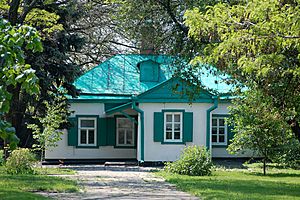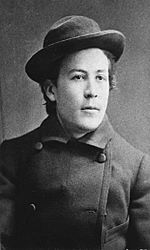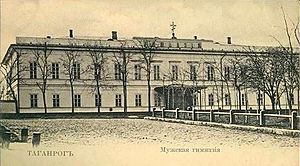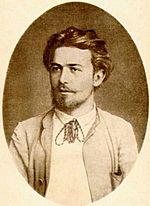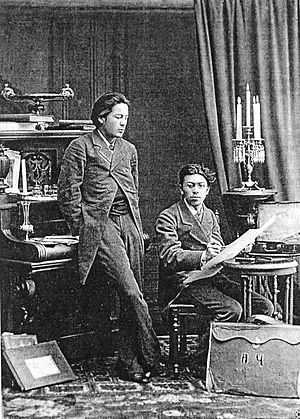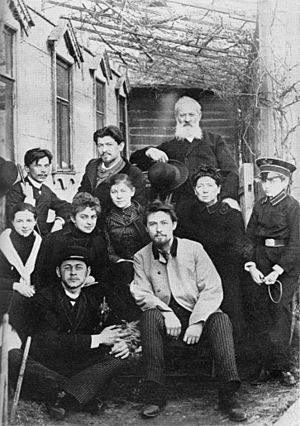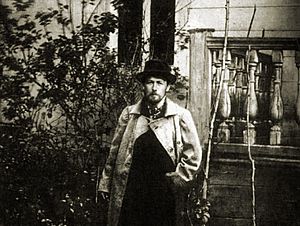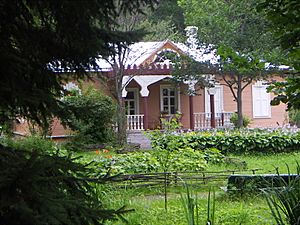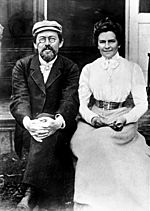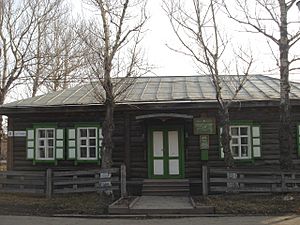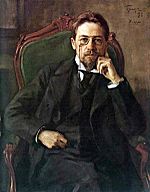Anton Chekhov facts for kids
Quick facts for kids
Anton Chekhov
|
|
|---|---|
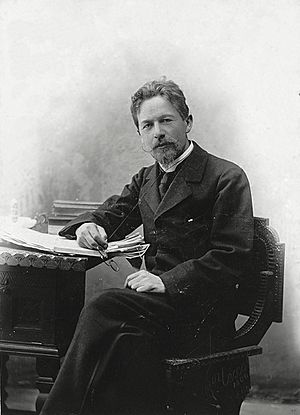
Chekhov in 1889
|
|
| Born | Anton Pavlovich Chekhov 29 January 1860 Taganrog, Ekaterinoslav Governorate, Russian Empire |
| Died | 15 July 1904 (aged 44) Badenweiler, Grand Duchy of Baden, German Empire |
| Resting place | Novodevichy Cemetery, Moscow |
| Occupation | Physician, short story writer, playwright |
| Language | Russian |
| Nationality | Russian |
| Alma mater | First Moscow State Medical University |
| Notable awards | Pushkin Prize |
| Spouse |
Olga Knipper
(m. 1901) |
| Relatives | Alexander Chekhov (brother) Maria Chekhova (sister) Nikolai Chekhov (brother) Michael Chekhov (nephew) Lev Knipper (nephew) Olga Chekhova (niece) Ada Tschechowa (great-niece) Marina Ried (great-niece) Vera Tschechowa (great-great niece) |
| Signature | |
 |
|
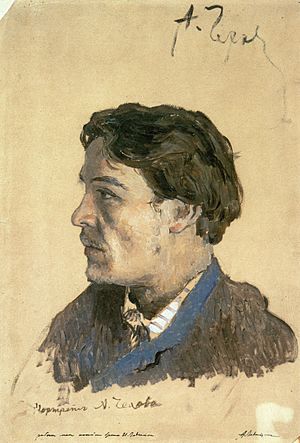
Anton Pavlovich Chekhov (Russian: Антон Павлович Чехов, IPA: [ɐnˈton ˈpavləvʲɪtɕ ˈtɕexəf]; January 29, 1860 – July 15, 1904) was a famous Russian playwright and short-story writer. Many people consider him one of the greatest writers of all time. He wrote four classic plays and many highly praised short stories.
Chekhov was also a doctor. He once said that medicine was his "lawful wife" and literature was his "mistress," showing how much both meant to him.
After his play The Seagull didn't do well at first in 1896, Chekhov almost gave up on theater. But the play became very popular later, thanks to Konstantin Stanislavski's Moscow Art Theatre. This theater also put on Chekhov's other plays like Uncle Vanya, Three Sisters, and The Cherry Orchard. His plays are known for showing real-life feelings and hidden meanings, rather than just simple actions.
Chekhov first wrote stories to earn money. But as he became a more serious artist, he created new ways of writing that changed how modern short stories are told. He believed that an artist's job was to ask questions, not to give all the answers.
Contents
Biography
Early Life and Family
Anton Chekhov was born on January 29, 1860, in Taganrog, a port city in southern Russia. He was the third of six children. His father, Pavel Chekhov, was the son of a former serf (a peasant who was tied to the land). Pavel ran a grocery store and was very strict.
Chekhov's mother, Yevgeniya, was a wonderful storyteller. She used to entertain her children with tales of her travels. Chekhov once said, "Our talents we got from our father, but our soul from our mother." He later criticized his father's strictness, remembering how difficult it made their childhood.
School and Hardship
Chekhov went to the Greek School and the Chekhov Gymnasium in Taganrog. He even sang in his father's choir and at a Greek Orthodox monastery.
In 1876, his father's business failed, and he went bankrupt. To avoid being sent to debtor's prison, his father moved to Moscow. The family lived in poverty there. Chekhov, who was 16, stayed behind in Taganrog to sell their belongings and finish school. He had to pay for his own education by tutoring, selling goldfinches, and writing short stories for newspapers. He sent all the money he could to his family in Moscow.
During this time, he read many books by famous writers like Cervantes and Turgenev. In 1879, he finished school and joined his family in Moscow. He was accepted into medical school at I.M. Sechenov First Moscow State Medical University.
Becoming a Writer and Doctor
After moving to Moscow, Chekhov took on the responsibility of supporting his family. He wrote many short, funny stories and scenes about Russian life every day. He used funny pen names like "Antosha Chekhonte." His writing quickly made him known as a clever writer who captured everyday life. By 1882, he was writing for popular magazines.
In 1884, Chekhov became a qualified doctor. He always considered medicine his main job, even though he didn't earn much money from it and often treated poor people for free. Being a doctor helped his writing because he met all kinds of people from different parts of Russian society.
Around 1884, Chekhov started coughing blood, which was a sign of tuberculosis. He kept writing to support his family, moving them to better homes as he earned more. In 1886, he began writing for Novoye Vremya (New Times), a very popular newspaper. The owner, Alexey Suvorin, became one of Chekhov's closest friends.
Soon, famous writers noticed Chekhov's talent. Dmitry Grigorovich, a well-known Russian writer, told Chekhov he had "real talent" and advised him to write less but focus on quality. Chekhov took this advice seriously. In 1888, his collection of short stories, At Dusk, won the respected Pushkin Prize for its artistic value.
Key Moments in His Career
In 1887, feeling tired and unwell, Chekhov traveled to Ukraine. This trip inspired him to write the long short story "The Steppe," which was a big step forward in his writing style. It showed his ability to describe feelings and thoughts in a new way.
That same year, a theater manager asked Chekhov to write a play. He quickly wrote Ivanov, which became a success. Chekhov's plays, like The Seagull (1895), Uncle Vanya (1897), The Three Sisters (1900), and The Cherry Orchard (1903), changed theater forever. They focused on showing how people truly act and speak, making plays feel more real. This idea of realism became a cornerstone for acting throughout the 20th century.
From this period came a famous idea called Chekhov's gun. This principle means that every detail in a story or play should be important and necessary. If something isn't needed, it should be removed.
In 1889, Chekhov's brother Nikolai died from tuberculosis. This sad event influenced Chekhov's story A Dreary Story, which is about a man who realizes his life has been without purpose. This made Chekhov think about his own life's purpose, and he became very interested in prison reform.
Journey to Sakhalin Island
In 1890, Chekhov made a difficult journey to Sakhalin Island, a penal colony (a place where criminals were sent) north of Japan. He spent three months there, interviewing thousands of prisoners and settlers for a census. The letters he wrote during this trip are considered some of his best.
What he saw on Sakhalin shocked him, including harsh punishments and corruption. He wrote, "There were times I felt that I saw before me the extreme limits of man's degradation." He was especially moved by the children living in the colony.
Chekhov later wrote that the government should provide humane treatment for the convicts. His findings were published in 1893 and 1894 as The Island of Sakhalin, a social science book. He also used his experiences to write the short story "The Murder," which has a section set on Sakhalin.
Life at Melikhovo
Chekhov spent a lot of money on medicine and traveled many hours to visit sick patients, which left him less time for writing. However, his work as a doctor gave him a deep understanding of all parts of Russian society. For example, he saw the difficult living conditions of peasants, which he wrote about in his story "Peasants."
In 1894, Chekhov started writing his play The Seagull at his country estate in Melikhovo. He had bought the estate and worked hard to improve it, planting many trees. He cared for these trees "as though they were his children."
The first performance of The Seagull in 1896 was a disaster, and the audience booed it. This made Chekhov want to stop writing for the theater. But the director Vladimir Nemirovich-Danchenko was impressed and convinced his colleague Konstantin Stanislavski to put on a new production in 1898. Stanislavski's focus on realistic acting brought out the hidden meanings in the play, and Chekhov became interested in playwriting again. The Moscow Art Theatre then asked Chekhov for more plays, and the next year they staged Uncle Vanya. In his later years, Chekhov became an atheist.
Years in Yalta and Death
In March 1897, Chekhov had a serious lung bleed while visiting Moscow. Doctors diagnosed him with tuberculosis and told him to change his lifestyle.
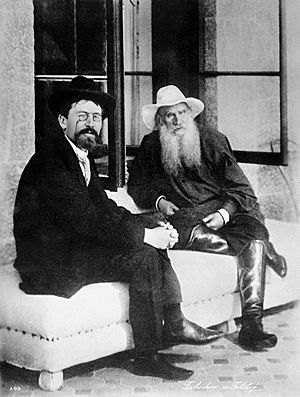
After his father died in 1898, Chekhov bought land in Yalta and built a house called The White Dacha. He moved there with his mother and sister. Even though he planted trees, kept pets, and had famous guests like Leo Tolstoy and Maxim Gorky, he often missed Moscow. In Yalta, he wrote two more plays for the Art Theatre, Three Sisters and The Cherry Orchard.
On May 25, 1901, Chekhov quietly married Olga Knipper, an actress he had met during rehearsals for The Seagull. Olga continued her acting career in Moscow, so they lived mostly apart, with Chekhov in Yalta and Olga in Moscow.
While in Yalta, Chekhov wrote one of his most famous stories, "The Lady with the Dog."
By May 1904, Chekhov was very ill with tuberculosis. On June 3, he traveled with Olga to a spa town in Germany called Badenweiler. He tried to sound cheerful in letters to his sister, saying he was getting better. However, Anton Chekhov died on July 15, 1904, at the age of 44, after a long battle with tuberculosis. He was buried next to his father in the Novodevichy Cemetery in Moscow.
Legacy
A few months before he died, Chekhov joked that people might only read his writings for seven and a half years after his death. But his fame grew much more than he expected. After he died, his play The Cherry Orchard was hugely popular, showing how much the Russian public admired him. He became almost as famous as Leo Tolstoy, another great Russian writer. Tolstoy himself greatly admired Chekhov's short stories.
Chekhov's work also influenced important thinkers. For example, the anarchist Peter Kropotkin said that if anyone doubted the poverty in Russia in the 1880s, they should "read only Chekhov's novels!" It is also said that Vladimir Lenin, a famous political leader, felt like a revolutionary after reading Chekhov's short story "Ward No. 6".
In England and Ireland, Chekhov's work wasn't very popular at first. But after his death, his stories were translated by Constance Garnett, and he gained many English-speaking readers. Writers like James Joyce, Virginia Woolf, and Katherine Mansfield admired his work.
Even though Chekhov is famous for his plays, many experts, like writer William Boyd, believe his short stories are his greatest achievement.
His Unique Style
George Bernard Shaw, a famous playwright, was one of the first non-Russians to praise Chekhov's plays. He even wrote a play called Heartbreak House that was inspired by Chekhov's style. Shaw noted how Chekhov showed the struggles of wealthy families in Russia, which were similar to those in Britain.
Ernest Hemingway, another influential writer, was less enthusiastic, saying Chekhov "wrote about six good stories. But he was an amateur writer." However, Vladimir Nabokov called "The Lady with the Dog" "one of the greatest stories ever written." He described Chekhov's writing as if "one person relates to another the most important things in his life, slowly and yet without a break."
Writer William Boyd believes Chekhov's big achievement was moving away from traditional "event plots" to stories that felt more "blurred, interrupted, mauled or otherwise tampered with by life." This made his stories feel more like real life.
Chekhov's comedies are also special. They use humor to show painful or awkward moments, making the audience reflect on what it means to be human.
Influence on Theater and Film
In the United States, Chekhov's fame grew thanks to Konstantin Stanislavski's acting system, which focused on "subtext" – the hidden meanings and feelings behind the words characters speak. Stanislavski said that Chekhov's characters often expressed their thoughts "in pauses or between the lines." This idea greatly influenced American playwrights, screenwriters, and actors, including Clifford Odets, Elia Kazan, and Lee Strasberg. Strasberg's Actors Studio and the "Method" acting approach, which influenced actors like Marlon Brando and Robert De Niro, were built on these ideas.
Chekhov also influenced Japanese playwrights like Shimizu Kunio and Yōji Sakate. They used his mix of humor and deep longing in their own works.
Many of Chekhov's works have been made into films. Examples include Sidney Lumet's Sea Gull and Louis Malle's Vanya on 42nd Street. Laurence Olivier directed a film version of Three Sisters in 1970. Chekhov's stories and plays are also referenced in many other movies, like Andrei Tarkovsky's The Mirror and Woody Allen's Hannah and Her Sisters. The 2022 Oscar-winning film Drive My Car is centered around a production of Uncle Vanya.
Some of Chekhov's short stories were also adapted into Indian television series like Katha Sagar and Chekhov Ki Duniya. The award-winning film Winter Sleep was adapted from Chekhov's short story "The Wife."
See Also
 In Spanish: Antón Chéjov para niños
In Spanish: Antón Chéjov para niños
- Chekhov Library
- Chekhov Monument in Rostov-on-Don
- Maria Chekhova
- Ann Dunnigan, English-language translator
- Jean-Claude van Itallie, English-language translator
Images for kids
-
Portrait of Anton Chekhov by Isaac Levitan (1886)
-
Chekhov with Leo Tolstoy at Yalta, 1900
 | William M. Jackson |
 | Juan E. Gilbert |
 | Neil deGrasse Tyson |


